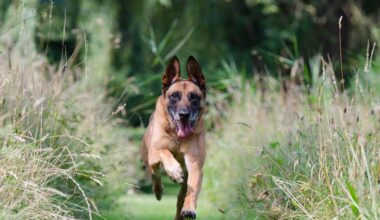Recognizing Medical Issues Behind Frequent Potty Training Accidents
Puppies are adorable, yet potty training can occasionally become a difficult task. Frequent accidents may signal a need to explore medical issues that hinder training. Understanding potential causes behind these accidents is crucial for effective problem-solving. Several medical conditions can lead to such situations. For instance, urinary tract infections could create urgency in puppies. Similarly, diarrhea can lead to accidents due to the inability to control bowel movements. Owners must observe their pets closely, looking for signs of discomfort or unusual behaviors. Additionally, hormonal imbalances can impact a dog’s ability to hold their bladder, causing frequent accidents. A vet’s guidance might be necessary for optimal health checks. When medical problems are ruled out, behavioral issues can also contribute to the situation. For example, anxiety and stress could lead to uncontrolled urination in puppies. Early identification of these behavioral problems ensures timely intervention, allowing for a smoother training process. Hence, monitoring your puppy’s behavior remains essential for addressing any training complications effectively. Paying attention to your puppy’s evolving needs fosters a healthier relationship and smoothens the potty training process. Understanding these factors ultimately leads to better outcomes for both pet and owner.
Pet owners often feel frustrated when faced with ongoing potty training difficulties caused by unrecognized medical problems. Consequently, it’s vital to engage with a veterinarian at the first signs of consistent accidents in puppies. Filtration through a veterinarian’s diagnosis can unveil hidden health issues impacting your pet’s bladder control. Routine check-ups encourage early detection of disorders facilitating urgent potty needs. For example, kidney problems can make a puppy drink excessively, resulting in frequent accidents. Besides, certain dog breeds are more prone to specific health issues that could impact training. Educating oneself about potential breed-related concerns can help in understanding and managing the situation. Moreover, parasites may remain hidden, causing unexplained stool or urination problems that ultimately lead to training failures. Consequently, addressing such concerns rapidly mitigates frustration. Alongside medical evaluations, implementing supportive training strategies is essential. Consistency builds confidence, especially during this challenging phase. Furthermore, positive reinforcement techniques may foster desired behaviors, increasing the likelihood of success. Integrating these methods alongside medical observations paves the way for an improved learning experience. Thus, combining medical awareness and effective training methods produces the best outcomes.
Besides physical health issues, behavioral problems in puppies can complicate potty training. Factors such as separation anxiety, fear, or changes in environment might affect their ability to control their bladders effectively. Recognizing these behavioral challenges can empower owners and trainers to respond appropriately. For instance, a puppy experiencing stress may show signs through frequent accidents. Identifying potential sources of stress, such as new surroundings or loud noises, aids in crafting a suitable training plan. Gradually easing the puppy into new situations diminishes anxiety, potentially enhancing bathroom control. On some occasions, a puppy may also lack proper training guidance. Inconsistent training may confuse a puppy, prompting unpredictable potty habits. Owners must maintain a consistent routine, as this fosters familiarity and confidence. To complement behavioral training, incorporating playtime and mental stimulation can relieve stress, further aiding effective potty training. Moreover, seeking help from professional trainers or canine behaviorists can bring about more structured training strategies. These professionals can provide customized advice based on individual needs. Consequently, blending medical and behavioral understanding ensures a comprehensive approach to potty training success.
Keep Observations Documented
Taking notes on potty training progress enables pet owners to identify patterns and potential issues. Documenting each accident, including circumstances surrounding them, supports the process. Tracking food and water intake can also yield insights into your puppy’s potty schedule, assisting with preventative measures. This organized system allows sharing information effectively with veterinarians and trainers. Moreover, noting any changes in diet or routine can reveal patterns associated with accidents. Other observations include monitoring the puppy’s reaction to training sessions and assessing their progress over time. Owners must analyze these records alongside professional guidance for optimal solutions. Reviewing patterns can help distinguish between behavioral and medical causes, ensuring appropriate interventions. For example, if accidents consistently occur after a specific activity, it may indicate an underlying concern. Furthermore, engaging in open communication with a veterinarian can relieve frustration and clarify questions regarding medications and health. This collaboration builds a comprehensive understanding of your puppy’s unique needs, streamlining potty training methods. Maintaining a detailed log fosters confidence and empowering owners, significantly improving their puppy’s chances of mastering potty training efficiently.
In some cases, the presence of underlying medical conditions exacerbates potty training challenges. For example, young puppies may develop bladder stones, a condition that can become painful and cause frequent urination. This condition typically occurs after dehydration, underscoring the significance of providing adequate water supplies. Additionally, puppies suffering from gastrointestinal issues could face unpredictable accidents due to their inability to hold their bowels. These medical conditions highlight the importance of veterinary care during potty training. Once any issues are identified and addressed, owners can refer to the veterinarian’s recommendations for managing the specific situation. Implementing dietary changes may also alleviate gastrointestinal problems, establishing a steady routine can encourage bladder health. Furthermore, a professional trainer may offer valuable tips for restructuring the training approach. This combined perspective balances medical attention with proper training, promoting effective puppy education. Moreover, maintaining a supportive and nurturing environment is crucial to build confidence in puppies. Creating a safe space where accidents are not punished encourages puppies to learn without fear. A powerful combination of medical awareness, proper dietary management, and positive reinforcement fosters effective potty training experiences.
Puppy owners must recognize the impact of emotional well-being on potty training. Stress and anxiety, whether stemming from environmental changes or overall insecurity, can disrupt a puppy’s control over urination. Recognizing these emotional triggers helps establish efficient strategies aligned with the puppy’s needs. For example, a puppy may struggle after transitioning to present situations filled with unfamiliar pets or people. Gradually socializing the puppy by introducing them to these experiences can reduce anxiety, aiding their learning process over time. Positive reinforcement plays a critical role in encouraging desired behaviors among puppies. Encouraging them with praise following successful bathroom visits builds a positive association with going outside. Regular outdoor excursions establish a routine, improving bladder control and promoting confidence. Patience is vital in this delicate phase; puppies will have challenges adjusting to different stimuli. Offering comfort, consistent routines, and addressing any emerging medical concerns amalgamates into a supportive learning environment. Moreover, including family members in the training reinforces a unified message, enabling the puppy to thrive. Creating an enriched environment boosts emotional stability, ultimately assisting puppies in mastering their potty training effectively.
Seek Professional Help if Necessary
When faced with repeated potty training accidents resulting from unidentified medical issues, proactively seeking professional help is paramount. Veterinarians are essential allies in this journey, providing valuable insights into medical conditions affecting bladder control. Following veterinary assessment recommendations could illuminate potential solutions unrecognized by mere observation. Professional trainers or canine behaviorists can also aid in incorporating behavioral strategies tailored to individual concerns. These experts help elucidate tips based on each puppy’s unique needs, ensuring a more effective training process. Consulting with professionals not only improves the training routine but fosters cooperation among family members involved in training. Moreover, realizing the benefits of sustained collaboration ensures all members contribute in positive ways. Regular sessions offering guidance and encouragement deliver results and help maintain motivation throughout the training phase. Providing a nurturing, structured environment enables puppies to adjust more efficiently, fostering long-term success. Additionally, discussing concerns with fellow puppy owners or online communities strengthens bonds and promotes shared experiences. Collectively addressing these challenges builds a supportive framework for ongoing growth for both pets and their families in their potty training journey.
Potty training should not be viewed merely as a simple phase in puppy development; instead, it encompasses an intricate blend of medical, behavioral, and situational elements. The combined approach leading to understanding and addressing the underlying causes of potty training accidents fosters wholesome relationships between owners and their puppies. Through diligent observation, documenting incidents, and enlisting the help of professionals, pet owners can transform potty training frustration into a fruitful experience. Puppies thrive when receiving proper guidance and understanding, allowing them to grow into well-balanced, well-behaved companions. Adopting a pretty approach to potty training attunes owners to their puppy’s needs, ensuring successful outcomes. As a result, caregivers cultivate environments that bolster lifelong companionship and love. Moreover, the lessons learned during this process could lay the foundation for other aspects of training, positively shaping their relationship in myriad ways. Ultimately, educating oneself about the underlying causes of frequent potty accidents paves the path toward mutual understanding and harmony in the owner-pet dynamic. This journey equips owners to provide best practices, ensuring the best of circumstances for their beloved puppies and establishing a lasting bond. Embracing patience, learning, and flexibility throughout the potty training phase is essential for long-term success.


